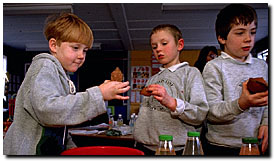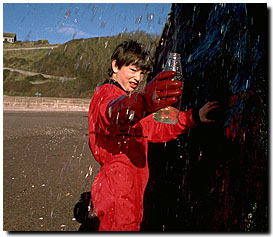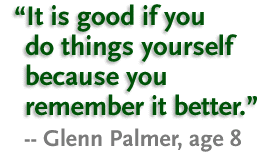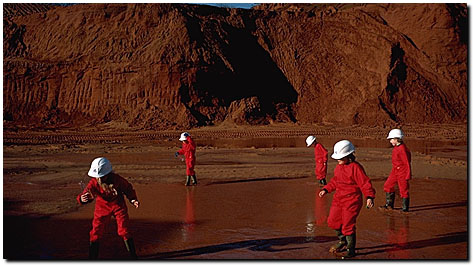
Tests back in the classroom included building filtration systems and performing conductivity tests. (Photograph by David Modell)
|

Water from the English Channel helped students learn about the importance of filtration and the need for potable water on a space journey. (Photograph by David Modell)
|
|
 rmed with the task of creating soil and water filtration tests, students in Exeter, England, visited a local sand quarry to collect red "Martian" soil and water from the nearby English Channel. After conducting experiments on the samples back in the classroom, the students discussed their findings with a visiting scientist. They then emailed their data back to "mission control" in the United States. In turn, American students posed some technical challenges, such as retrieving a wayward satellite into the cargo, to their British counterparts. The British team swung into action, using a bean can to simulate the satellite and a hastily made "robotic" arm. After rescue attempts failed, one student volunteered to do "extra vehicular activity" (EVA) and bring back the satellite.
rmed with the task of creating soil and water filtration tests, students in Exeter, England, visited a local sand quarry to collect red "Martian" soil and water from the nearby English Channel. After conducting experiments on the samples back in the classroom, the students discussed their findings with a visiting scientist. They then emailed their data back to "mission control" in the United States. In turn, American students posed some technical challenges, such as retrieving a wayward satellite into the cargo, to their British counterparts. The British team swung into action, using a bean can to simulate the satellite and a hastily made "robotic" arm. After rescue attempts failed, one student volunteered to do "extra vehicular activity" (EVA) and bring back the satellite.
As the classes exchanged details of the make-believe drama, many conversations were started between individual students concerning their lives and homes. But most important, the experience made a lasting impression on the students. Instead of passively watching a video tape or listening to a dry lecture, the students had been active participants. "It is good if you do things yourself because you remember it better," said eight-year-old Glenn Palmer.
|

|
|







 rmed with the task of creating soil and water filtration tests, students in Exeter, England, visited a local sand quarry to collect red "Martian" soil and water from the nearby English Channel. After conducting experiments on the samples back in the classroom, the students discussed their findings with a visiting scientist. They then emailed their data back to "mission control" in the United States. In turn, American students posed some technical challenges, such as retrieving a wayward satellite into the cargo, to their British counterparts. The British team swung into action, using a bean can to simulate the satellite and a hastily made "robotic" arm. After rescue attempts failed, one student volunteered to do "extra vehicular activity" (EVA) and bring back the satellite.
rmed with the task of creating soil and water filtration tests, students in Exeter, England, visited a local sand quarry to collect red "Martian" soil and water from the nearby English Channel. After conducting experiments on the samples back in the classroom, the students discussed their findings with a visiting scientist. They then emailed their data back to "mission control" in the United States. In turn, American students posed some technical challenges, such as retrieving a wayward satellite into the cargo, to their British counterparts. The British team swung into action, using a bean can to simulate the satellite and a hastily made "robotic" arm. After rescue attempts failed, one student volunteered to do "extra vehicular activity" (EVA) and bring back the satellite.
